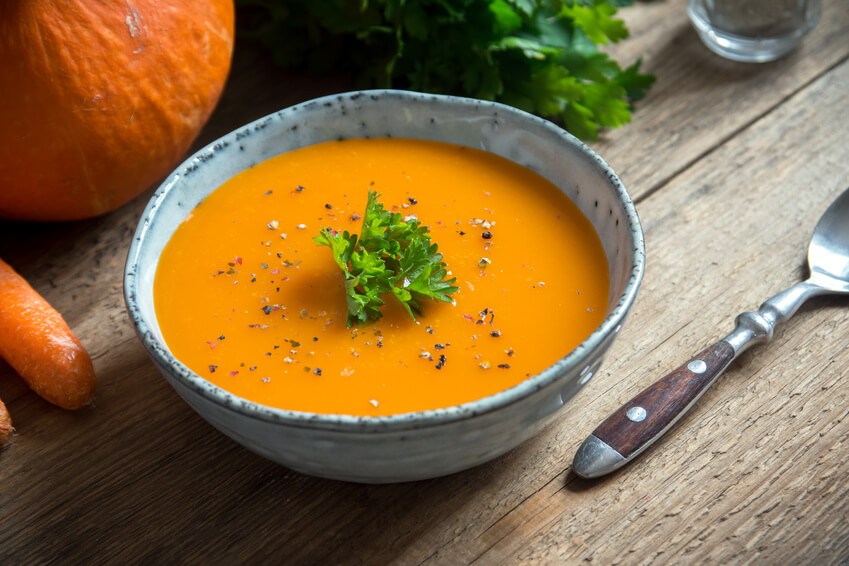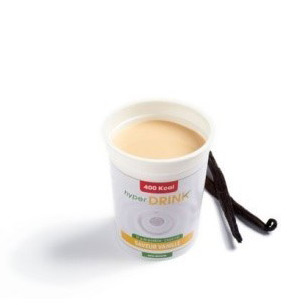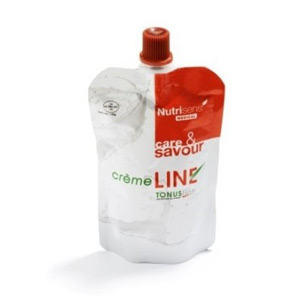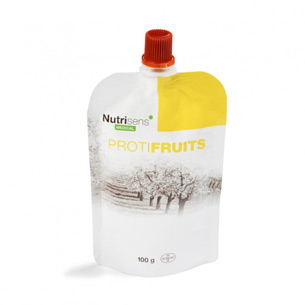
Treating undernourishment
Too often, undernourishment is caught at a late stage, which is detrimental to health given that the longer the problem persists, the greater the likelihood of a downward spiral, with the patient eating less and less. Treating undernourishment requires an array of strategies, from presentation on the plate to oral dietary supplements.
Strategies to combat the problem include:
1 / Food enrichment
For persons at risk of undernourishment, enrichment is the usual strategy. It involves increasing the amount of protein and calories in meals without increasing portion size, using powdered supplements.
On average, daily intake is increased by 20 grammes of protein and an extra 250 kcal.
Where is the extra protein derived from? Here are a few examples of equivalences:
| 20g of protein = |
100g of meat or 2 slices of ham 2 eggs 100g fish or a small tin of tuna 600ml milk 2 portions fromage blanc 80g grated cheese 5 portions of soft cheese 45g milk powder or full fat condensed milk 20g powdered protein (Protinut® or Protipulse®) |
Enriching your diet
Enrichment involves supplementing a normal diet.
This may be done by adding to the normal diet, or via powdered proteins, enriched preparations or ready-to-eat products.
A few examples:
| Dish: | Homemade supplement | Nutrisens products |
|---|---|---|
| SOUPS |
– Cream, butter – Powdered milk, grated cheese, cream cheese – Ham, eggs |
– 1 packet of Protinut® in your soup (neutral taste) – 1 Packet HP/HC soup: just add water |
| STARTERS |
– Enrich salads with hard-boiled eggs, cheese, ham, chicken, tuna, prawns, seafood sticks, sweetcorn, croutons, olives etc. – Regularly consume carbohydrate-based starters such as tabbouleh, rice salad, pasta salad etc. |
|
| VEGETABLES |
– Serve baked with a cheese crust or with a béchamel sauce with cheese, cream, butter and eggs. – Serve vegetable flans, tarts and pies. |
|
| MASHES | – Add egg yolk, cheese, ham, meat juices, melted cheese or milk powder | – 1 packet of Protinut® in your mash |
|
CEREALS (starchy foods) |
– Add cheese, butter, cream, egg yolk, ham, mince etc. |
– 1 G-bread® Nutrition – 1 packet of Céréal’Nut HP+® |
|
DAIRY FOOD AND DESSERTS |
– Add powdered milk, sweet condensed milk, cream, jam, honey, caramel, chestnut paste, chocolate, fruit etc. – Eat rice cakes, couscous, egg flans, custard, clafoutis etc. |
– 1 packet of Protipulse® in your cakes or yoghurts. – 1 HP/HC Proti-fruits® purée |
| DRINKS |
– Enrich milk with powdered milk, powdered protein or sweet condensed milk. – Use full-fat milk |
1 stick of Protipulse® in drinks |
| For a treat |
– 5 HP chocolate sweets per day – 1 G-bread® nutrition |
Nutrisens supplies powdered protein meal supplements to increase daily intake, dehydrated mixes for drinks and soups, enriched in proteins or calories and ready-to-eat snacks to eat on the go (cakes, drinks or pastries).
| Ingrédient | Ready-to-eat | ||
|---|---|---|---|
| Breakfast | Powdered protein (Protinut® or Protipulse® | Céréalnut HP+® | G-bread® Nutrition |
| Snack | Fruity’drink HP | HP chocolate sweets | |
| Meals | HP/HC soup | Proti-fruits® | |
2 / Dietary supplements
When enrichment is not sufficient to curb the problem, or the patient is in an advanced state of undernourishment, oral dietary supplements may be prescribed.
This method can provide an extra 30g of protein and 400 kcal per day.
Products are especially designed for specific uses: drinks, creams, purées, breakfast mixes and soups.
The recommended daily intake is one to three supplements.
As their name suggests, dietary supplements should supplement meals, not replace them.
They should be taken 1 to 3 times a day to cover the needs.
Nutrisens has developed a range of dietary supplements to address the symptoms of undernourished people:
|
Hyperdrink®
|
Cremeline®
|
Proti-fruits®
|


